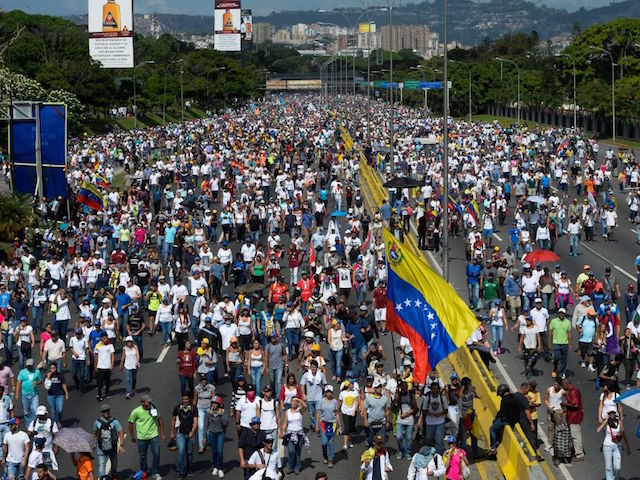An NGO operating in Venezuela revealed this week that the government has committed a known 2,977 arrests since anti-socialist protests erupted in April and is currently keeping 1,351 citizens behind bars for protesting.
The Venezuelan Penal Forum added that they have documented 355 cases of civilians being tried for military crimes in front of military tribunals, a gross human rights violation.
The newspaper El Nacional carried the new statistics from the Penal Forum on Tuesday, which span April 1 to May 29. During a press conference, NGO head Alfredo Romero specified that most of those facing military tribunals despite being civilians are facing charges of “treason, assault of soldiers, and rebellion.”
The government has repeatedly accused protesters of attacking Bolivarian National Guard (GNB) members, though photos and video from protest centers show GNB soldiers attacking unarmed protesters with tear gas, rubber bullets, and armored vehicles. An estimated 12 percent of those still detained are facing military tribunals.
Among those still imprisoned, Romero noted, were 21 women; 196 girls were also detained and released. “[The regime] has been characterized by its detention of women and students,” he noted.
On Twitter, the Penal Forum noted that the largest number of political prisoners are students, making that inmate population disproportionately young.
#30My There are 309 political prisoners in #Venezuela, of those:
118 students
32 military
12 political leaders pic.twitter.com/GdjE8RLJjU .— Foro Penal (ENG) (@ForoPenalENG) May 31, 2017
While these numbers largely consist of civilians, the Penal Forum has also reported that dozens of Venezuelan soldiers have refused to carry out Maduro’s orders or expressed dissatisfaction with socialism, leading to their arrest.
The Venezuelan news site Runrunes cites a different NGO, Proiuris, finding similar numbers of arrests and detentions, and tallied over one thousand injuries throughout the protests, hundreds more than the number of injuries during the same time frame in 2014.
In February 2014, dictator Nicolás Maduro ordered the arrest of Popular Will opposition party leader Leopoldo López, triggering a wave of protests that lasted most of the year and culminated in an opposition takeover of the legislature, the National Assembly. López remains behind bars to this day, convicted and sentenced to 14 years in prison for arson, terrorism, and other charges. López had organized a peaceful protest against Maduro before his arrest.
The NGOs are striving to keep international pressure on the Maduro regime, particularly for the use of military tribunals on civilians. Venezuela’s Attorney General, Luisa Ortega Díaz, confirmed their reports last week, defying the Chavista dictatorship that appointed her. Ortega announced that she had confirmed that a particularly controversial death – that of 20-year-old Juan Pernalete, who died when a tear gas canister exploded on his chest – was the product of GNB abuse.
“Use of violence as a political weapon does not contribute to a climate of trust and tranquility in society,” she said in a press conference.
The Chavista establishment has called Ortega a “traitor” and apologized for appointing her. Venezuela’s state television has also continued to advertise the use of the military to quash dissent. In an article published Tuesday, the government’s VTV boasted of Maduro meeting with the head of a military operation dubbed the Zamora Plan 200, intended to “organize, integrate, mobilize and guarantee on a national, state, and municipal level all the logistic processes of the campaign on the road to the beginning of the National Constituent Assembly.” Maduro has called this constituent assembly to draft an entirely new Constitution, expected to dramatically expand executive power.
While few details of the greater Zamora plan have made it to the public, the government has claimed it is a military mission to prevent a U.S.-orchestrated coup against the socialist government, while observers note the plan would grant the GNB expansive liberties in using violence to silence dissent.
The past 60 days of protest have been marked by extreme GNB violence, including soldiers running over protesters using armored vehicles and attacking even prominent leaders of the opposition. On Tuesday, soldiers attacked Miranda state governor Henrique Capriles Radonski, who accused them of “criminal action” intended to “subjugate the citizenry.”
“The new phase of the Zamora Plan is more repression and all-out shooting because they want, in ten days, to diminish the protests, but they must know that, the more repression, the more people will come to the streets, because Venezuela will not surrender,” Capriles asserted to the press.
Estimates of the number of Venezuelans who have died since protests resurged in April range from 56 to 77.

COMMENTS
Please let us know if you're having issues with commenting.